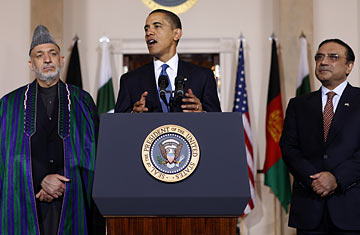
President Barack Obama makes a statement to reporters in the White House after his meeting with Afghan President Hamid Karzai, left, and Pakistani President Asif Ali Zardari.
Pity the Obama Administration, having to behave as if Pakistan's President Asif Ali Zardari and Afghanistan's President Hamid Karzai were reliable stewards of U.S. security interests in the world's most troubling trouble-spot. An epic suspension of disbelief is required to cast either of the men Obama welcomed at the White House on Wednesday as capable of leading a successful fight against the Taliban. Zardari's approval ratings are lower than those of the reviled former dictator President Pervez Musharraf; his army is reluctant to go to war against a section of the country's citizenry; and Pakistani public opinion remains more hostile to the U.S. than to the Taliban. Karzai, meanwhile, has long been written off by Washington an incapable of providing the kind of governance essential to winning a counterinsurgency war. Still, in response to the growing legion of skeptics on Capitol Hill, the Administration might well ask: Does anyone have a better idea?
The wars in Afghanistan and Iraq have exposed the limits of U.S. military power in imposing Washington's will, and the declining world economy has, if anything, further limited America's appetite for foreign entanglements. It's not as if the U.S. is in a position to take over from Karzai or Zardari, and appealing alternatives are scarce. The same can be said for the challenges Obama faces in Iraq, and in the conflict between Israel and the Palestinians. On all of those fronts, Washington confronts the reality that the partners on which it is forced to rely are either deeply flawed, or at odds with U.S. strategy.
Right across the "arc of instability" that stretches from Afghanistan to the Mediterranean, the new Administration is faced with less than helpful leaders. A guide to the lemons that the U.S. must turn into lemonade:
Pakistan: Grim Options
Asif Ali Zardari, despite being democratically elected, may be politically
doomed — and unable to deliver on U.S. demands that he wage a civil war
that would be unpopular even with many Pakistanis who oppose the Taliban.
Lately, there's been growing speculation that the Administration may be
turning its attention to cultivating opposition leader Nawaz Sharif, who is
currently Pakistan's most popular politician. Widespread reports suggest
that the Obama Administration hopes to persuade Zardari and Sharif to share
power in a new unity government committed to fighting the Taliban. But like
Zardari and his late wife, the slain former Prime Minister Benazir Bhutto,
Sharif has a poor track record in power, and is viewed by the military as
part of the same venal political class motivated primarily by self-interest.
The conservative Sharif, who has previously criticized Pakistan's efforts on
behalf of the U.S. war on terror — and was deemed by the U.S. to be soft
on the Taliban — may indeed have more support in Pakistan right now, and
also from the likes of Saudi Arabia, but it's hard to imagine him
championing Washington's agenda any more effectively than Zardari has done. (See pictures of Pakistani forces battling the Taliban in Swat Valley)
Should the politicians fail to agree on a new power sharing formula, prospects increase for a military takeover. While Army Chief of Staff General Ashfaq Kiyani — the most powerful man in Pakistan, who maintains his own close relationship with the U.S. — is said to have no appetite for political power, the spiraling social and political crisis could prompt him to oust the elected government and install an administration of technocrats. There's no sign of this happening yet, but it remains the only plausible alternative to either Zardari or Sharif. And, of course, the military has not exactly been gung-ho about taking the fight to the militants on its own turf. In short, there simply is no leadership in Pakistan willing or able to do much of what Washington would like a Pakistani leadership to do. Washington has no alternative but to back one or other of the flawed options, because the alternative could prove even more disastrous to U.S. interests.
NEXT: Afghanistan
